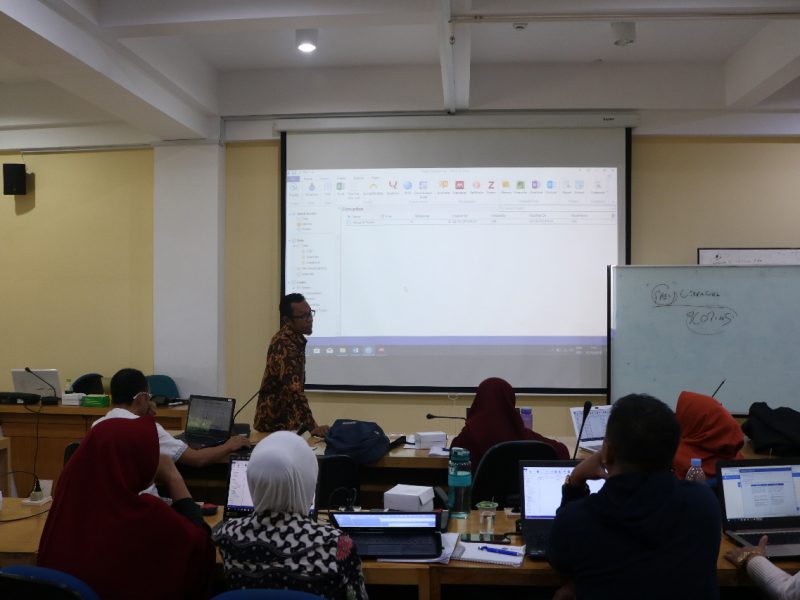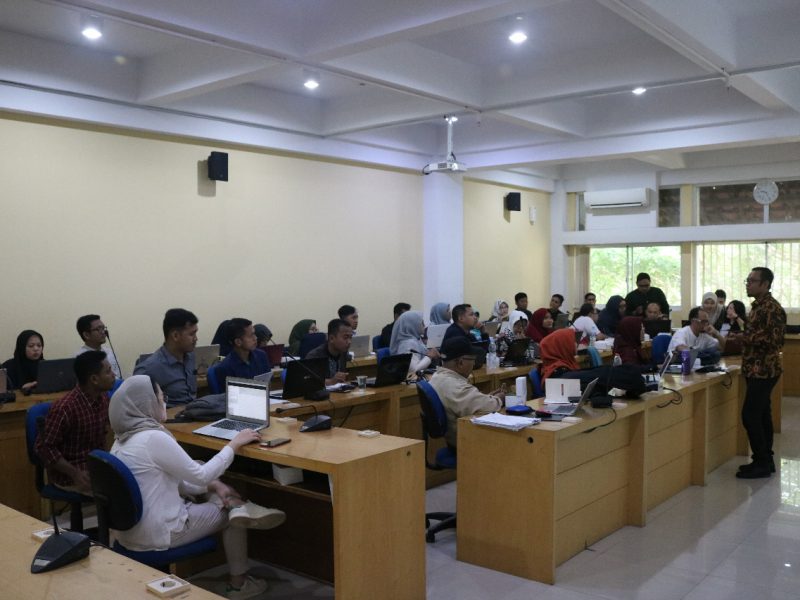Facing Global Research Trends, MGAA Holds NVIVO Application Training

The Master of Government Science of Muhammadiyah University of Yogyakarta in Academic Visiting held a Nvivo Training. Located in Room 310 of the Postgraduate Building of the University of Muhammadiyah Yogyakarta, approximately 50 participants were present consisting of MIP students, S3Pi students and Khon Khen students who attended the training guided by Dr (cand). Salahudin, S.IP., M.Sc., MPA who is a Lecturer at the University of Muhammadiyah Malang, participants not only listen to the material but are also guided to do hands-on practice. The purpose of this training is that participants can master qualitative data analysis using Nvivo for the business and management world.
In the 2-day training, participants were introduced to a number of basic Nvivo features, and how to operate them. Before doing the practice, participants were given an introduction about NVivo with one example of its use in research that was conducted by researchers in Iran to predict election results using data taken from Wikipedia. From the case, Udin emphasized to the participants that NVivo was useful to efficiently assist qualitative research, assist in the consumption of logic and research design, and provide facilities for analyzing content. Therefore, as an initial meeting Udin explained several important features that the participants could use to help process the qualitative research data that was being worked on.
 The first feature is the Create New Project to create a new job by giving the name of the research being worked on. Once created, the next step is to enter the literature file used in the study. In this step, the Import Feature is introduced which functions to enter external, internal, and memos data. External data is data in the form of links originating from the cloud or referred to as hyperlink data, internal data is data taken from the disk, while memos are small notes made related to research. The data can be imported in the form of documents, PDFs and images. All three data are entered in the same way.
The first feature is the Create New Project to create a new job by giving the name of the research being worked on. Once created, the next step is to enter the literature file used in the study. In this step, the Import Feature is introduced which functions to enter external, internal, and memos data. External data is data in the form of links originating from the cloud or referred to as hyperlink data, internal data is data taken from the disk, while memos are small notes made related to research. The data can be imported in the form of documents, PDFs and images. All three data are entered in the same way.
In addition, data that can be included is capture containing content from a social media account. Capture that can be included is the capture generated by the NCapture feature as a default Nvivo application that is automatically installed in Google Chrome when installing NVivo. NCapture can be used to capture content written on social media. For Twitter, NCapture is used automatically to capture tweets written for 3 months, while for NCapture Facebook can be used by scrolling the account profile that we want to analyze. The output of this feature is complete data about the account that we capture. According to Udin, NCapture makes it easy to get research data related to the analysis of social media content, without the need to read and analyze posts one by one. (AS)
In the 2-day training, participants were introduced to a number of basic Nvivo features, and how to operate them. Before doing the practice, participants were given an introduction about NVivo with one example of its use in research that was conducted by researchers in Iran to predict election results using data taken from Wikipedia. From the case, Udin emphasized to the participants that NVivo was useful to efficiently assist qualitative research, assist in the consumption of logic and research design, and provide facilities for analyzing content. Therefore, as an initial meeting Udin explained several important features that the participants could use to help process the qualitative research data that was being worked on.
 The first feature is the Create New Project to create a new job by giving the name of the research being worked on. Once created, the next step is to enter the literature file used in the study. In this step, the Import Feature is introduced which functions to enter external, internal, and memos data. External data is data in the form of links originating from the cloud or referred to as hyperlink data, internal data is data taken from the disk, while memos are small notes made related to research. The data can be imported in the form of documents, PDFs and images. All three data are entered in the same way.
The first feature is the Create New Project to create a new job by giving the name of the research being worked on. Once created, the next step is to enter the literature file used in the study. In this step, the Import Feature is introduced which functions to enter external, internal, and memos data. External data is data in the form of links originating from the cloud or referred to as hyperlink data, internal data is data taken from the disk, while memos are small notes made related to research. The data can be imported in the form of documents, PDFs and images. All three data are entered in the same way.In addition, data that can be included is capture containing content from a social media account. Capture that can be included is the capture generated by the NCapture feature as a default Nvivo application that is automatically installed in Google Chrome when installing NVivo. NCapture can be used to capture content written on social media. For Twitter, NCapture is used automatically to capture tweets written for 3 months, while for NCapture Facebook can be used by scrolling the account profile that we want to analyze. The output of this feature is complete data about the account that we capture. According to Udin, NCapture makes it easy to get research data related to the analysis of social media content, without the need to read and analyze posts one by one. (AS)